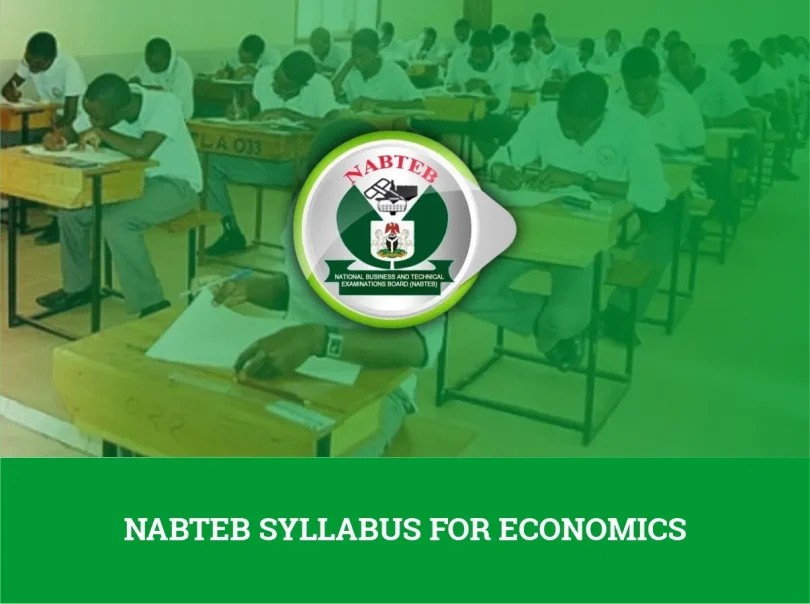Ready to write the NABTEB Economics? The NABTEB Syllabus for Economics is your roadmap; it is carefully structured to build your proficiency in economic concepts, analytical tools, and Nigeria’s economic framework. You will learn not just definitions, but how they play out in national development, policy formulation, and international trade.
By studying the NABTEB Syllabus for Economics, you will gain a clear framework for analyzing economic issues, evaluating trends, and solving practical problems.
The structured approach fosters critical thinking and gives you the confidence to interpret real-world events; perfect for exam success and beyond. Plus, the friendly layout ensures you will not feel overwhelmed; instead, you are guided step by step toward mastery.
NABTEB Syllabus for Economics
| Topic Area | Key Subtopics |
|---|---|
| Money & Monetary Theory | Types of money, characteristics & functions; demand & supply; quantity theory; link between money value & prices. |
| Inflation & Deflation | Definitions: causes, effects, and control methods for both inflation and deflation |
| Banking | Bank types, historical origin, commercial bank roles, credit creation & limits, impact on Nigeria |
| Central Bank & Financial Institutions | Role, functions, history of the Central Bank; other institutions (e.g., insurance, stock exchange) |
| Agriculture & Industry | Agricultural methods, marketing, challenges; types of industries; localization; growth barriers |
| National Income | GNP, GDP, NNI definitions; computation methods; APC, APS, MPC & multiplier; income relationships |
| Public Finance & Budgeting | Government revenue/expenditure; tax systems and incidence; budgeting and fiscal policy; revenue allocation |
| Public Debt | Types of debt, debt servicing issues, and national debt impacts |
| International Trade & Currency | Basis and barriers; trade principles, merits/demerits; terms of trade; balance of payments; devaluation |
| Economic Integration | Types of integration: ECOWAS origin, benefits, and challenges |
| Economic Planning & Resources | Planning processes and plans (pre-’85 & post-’85); natural resources (petroleum, NNPC, OPEC) |
| International Organizations | Functions and benefits to Nigeria |
Examination Structure
The NABTEB Economics exam is built to assess both theory and analytical skills. It typically includes two main sections:
Section A – Objective/Multiple Choice
- This part tests your grasp of fundamental economic concepts, such as principles of demand and supply, elasticity, national income, and Nigeria’s economic framework. Expect straightforward questions aimed at assessing your conceptual clarity and recall.
Section B – Essay/Structured Questions
- In this section, you will encounter longer responses requiring you to analyze data, explain economic phenomena (like monetary trends, fiscal policy, or trade issues), and apply economic models to real-world contexts. Nigerian industries, state institutions, and policy implications are commonly tested. Answers here should be well-structured, evidence-based, and relevant to the prompts.
Recommended Textbooks
To prepare effectively, the following textbooks are widely recommended for depth, clarity, and alignment with NABTEB topics:
- Aderinto, A.A. et al. (1996) – Economics: Exam Focus (University Press Plc, Ibadan)
- Black, J. (1997) – Oxford Dictionary of Economics (Oxford University Press)
- Brownson-Oton, Richard (2010) – What is Micro-Economics? and What is Macro-Economics? (Niky Printing & Publishing)
- Eyiyere, D.O. (1980) – Economics Made Easy (Quality Publishers Ltd, Benin City)
- Fajana, F. et al. (1999) – Countdown to SSCE/JME Economics (Evans, Ibadan)
- Falodun, A.B. et al. (1997) – Round-up Economics (Longman, Lagos)
- Koutsoyiannis, A. (1979) – Modern Microeconomics (Macmillan, London)
- Lawal, O.A. (1985) – Success in Economics (John Murray, London)
- Lipsey, R.G. (1997) – An Introduction to Positive Economics (Oxford University Press)
- Samuelson, P. & Nordhaus, W. (1989) – Economics (McGraw-Hill, Singapore).
Conclusion
The NABTEB syllabus for Economics offers a solid foundation for understanding both theoretical and practical aspects of economics, with a clear focus on Nigeria’s economic environment. Mastering this syllabus not only prepares students for exams but also equips them with real-world analytical skills essential for academic and career success.







Leave a Comment